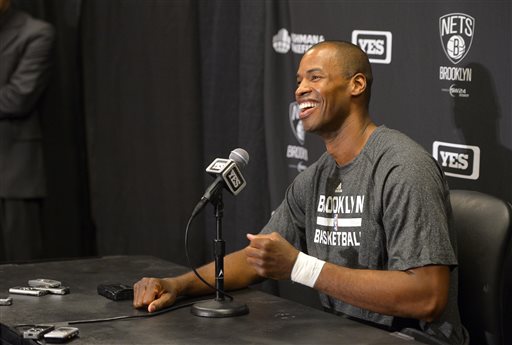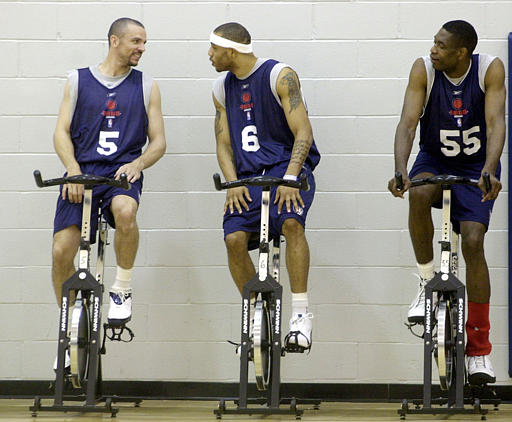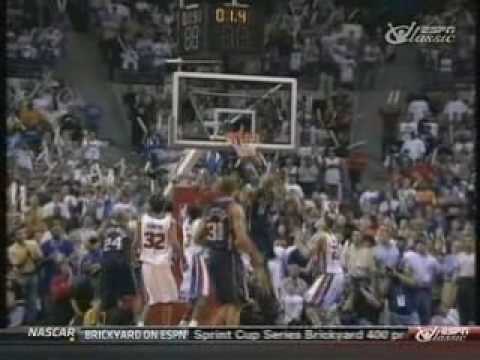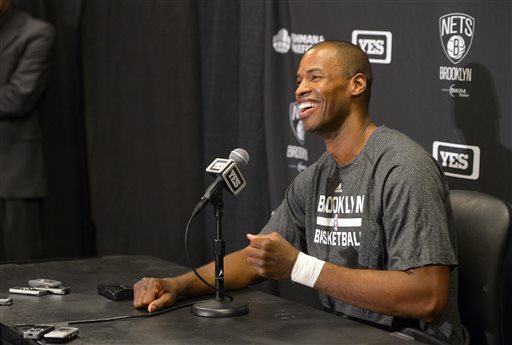
LOS ANGELES — When Jason Collins turned his head in the middle of his Brooklyn Nets introductory press conference to answer a question and a flurry of cameras shuttered in his face, you could tell he didn’t enjoy this spotlight. He was not comfortable with the level of attention he received after a career of thriving in the background. Collins wants his stint with the Nets to transgress in much the same way that he would like society to adapt to gay athletes: as a non-issue.
Collins is, of course, smart enough to understand the reality of the situation. Many critics of the coverage Collins has received over the past 10 months ask fairly: “Why can’t Collins just be gay and play basketball? Why does it have to be a spectacle?”
That question has merit. Shouldn’t our society be able to accept Jason Collins without a media narrative the force of which we’ve rarely seen before? That’s the goal, yes, but conceiving of Collins’ situation as a non-story today is somewhat premature. Someone had to do what Collins did. It was a necessary advancement. We could never get past this point without Collins. The integration of gay athletes into professional sports will develop much like any other social edification. It will happen gradually and step by step.
The news is the examination of the abnormal, and, unideally, Collins is abnormal in the NBA and in all of professional sports right now. Examine a story enough and it becomes the norm. When it becomes the norm, people stop caring about it. Collins’ announcement last April, Michael Sam’s announcement a few weeks ago, and Collins’ appearance for the Nets Sunday night in their 108-102 victory over the Los Angeles Lakers were three steps in the right direction, and boy, was tonight’s step a big one.
“I don’t have time to think about history,” Collins said pregame. “I just have to focus on my job tonight.”
The tone of Collins’ pre- and post-game press conferences in front of a throng of thirsty reporters was unfailingly direct. Collins is focused on helping his basketball team win. There was no discussion of the message of all this or what it means as a social event. Collins isn’t concerned with all that. At one point pre-game, a reporter asked Collins what his message to people who want to follow in his footsteps would be. What Collins said was predictable.
“Be your authentic self.”
Collins’ message, however, was far more evident in how he acted than how he spoke. His total burial of the distractions and issues the media wanted to capitalize on was more of a lesson to gay athletes than anything he could have said.
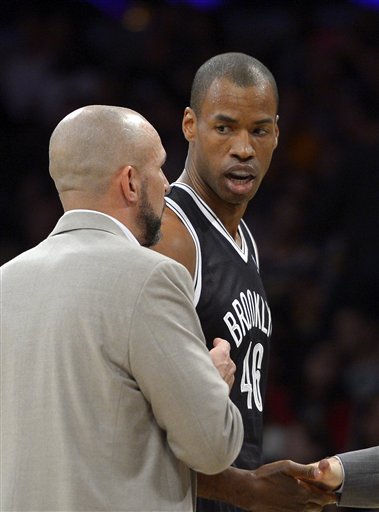
“He is a basketball player and he’s been doing this for a long time, so that didn’t change,” said Deron Williams. “It was just another game for us tonight.”
Paul Pierce: “It’s about being part of a team and caring for one another. That’s all that matters at the end of the day.”
If the Nets handle the media like they did tonight, this story isn’t going to be around for long.
So what about that basketball? Collins showed early his signing wasn’t merely a conduit for social progress. He played 11 minutes. If you’ve ever seen Collins play before, you know how those 11 minutes went. Screens and defense. Screens and defense. Collins checked in, received some applause, and played basketball.
And that’s just what any advocate of social justice could want. Collins’ sexuality, to my eye, had no impact on this basketball game. The Nets were far more concerned with stitching the wound of horrid defense that Andray Blatche sliced open to worry about the meaning of Collins’s appearance. With no Kevin Garnett, he played deserved minutes. Including minutes down the stretch. After not playing basketball for nearly a year.
Blatche and Paul Pierce post-game mocked the media’s infatuation with Collins. “We have 15 guys,” they joked. “They left their families to be out here!” Their jovial attitude didn’t strike me as that of two guys bogged down to be playing with a gay teammate. It struck me more as relief that the Nets won a basketball game the outcome of which was, for extended periods, very much in doubt against a bad team.
Because that’s all it is.
Collins worked tirelessly to get himself in good enough shape to help an NBA team win this year. He talked extensively about his offseason program, which included five-mile trail runs with 30-pound weighted vests, “hours and hours” in the weight room, and plenty of “skill work.” He didn’t mention any worry about what people would think of him or any media distraction or fitting in with his next team. And he went on about his routine, slowly taking the life out of the seemingly 150-degree conference room packed with bodies. The questions got more and more mundane, more and more average. Collins had an answer for all of them. So did Kidd. So did the other Nets in the locker room.
When Collins smiled as those cameras fluttered in his face pre-game, there was a moment of discomfort. When he left his post-game press conference, everyone just wanted to go home. The Nets beat the Lakers in another ho-hum February NBA game. And that is precisely what Collins wants. The exciting and mysterious turned into the mundane. Society could learn a lot from this ho-hum February NBA game, and if the Nets keep playing their cards like they did tonight, socially conscious non-Nets fans will get what they want: to stop caring about Jason Collins.

